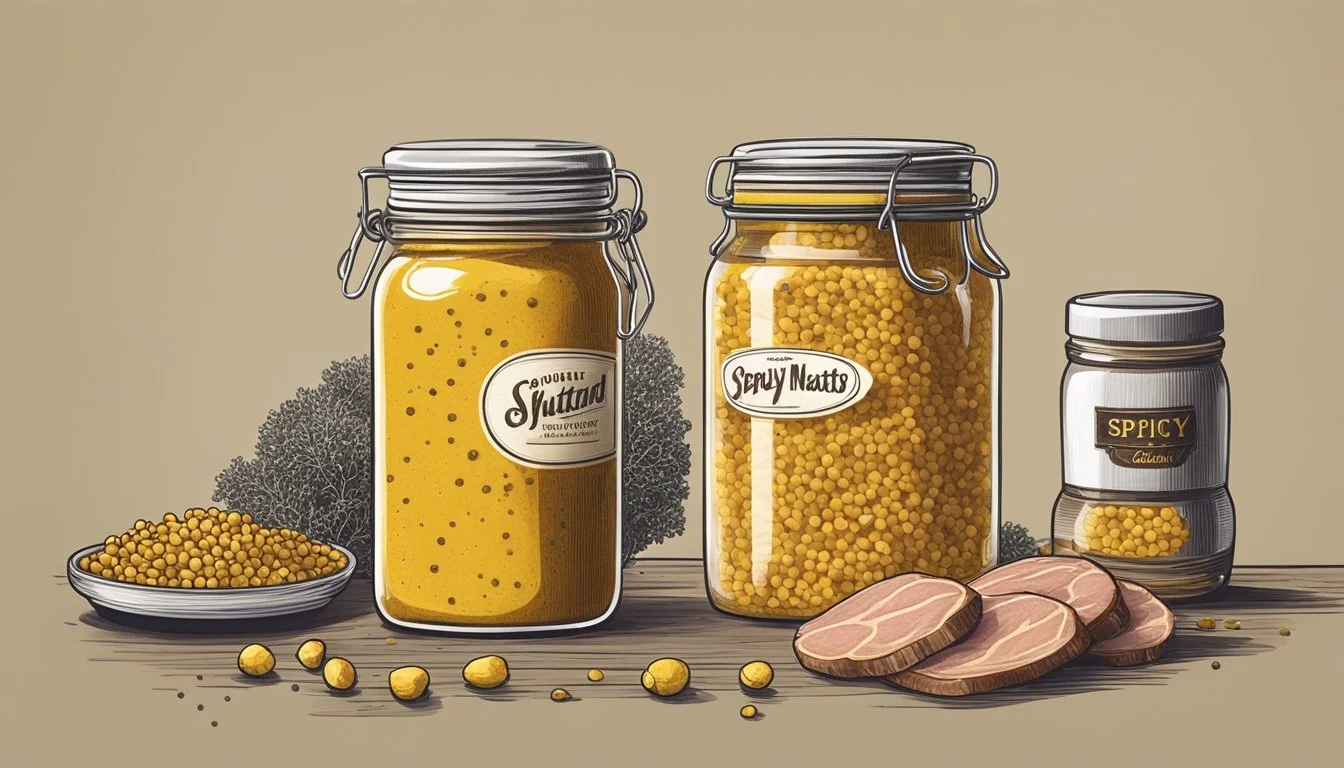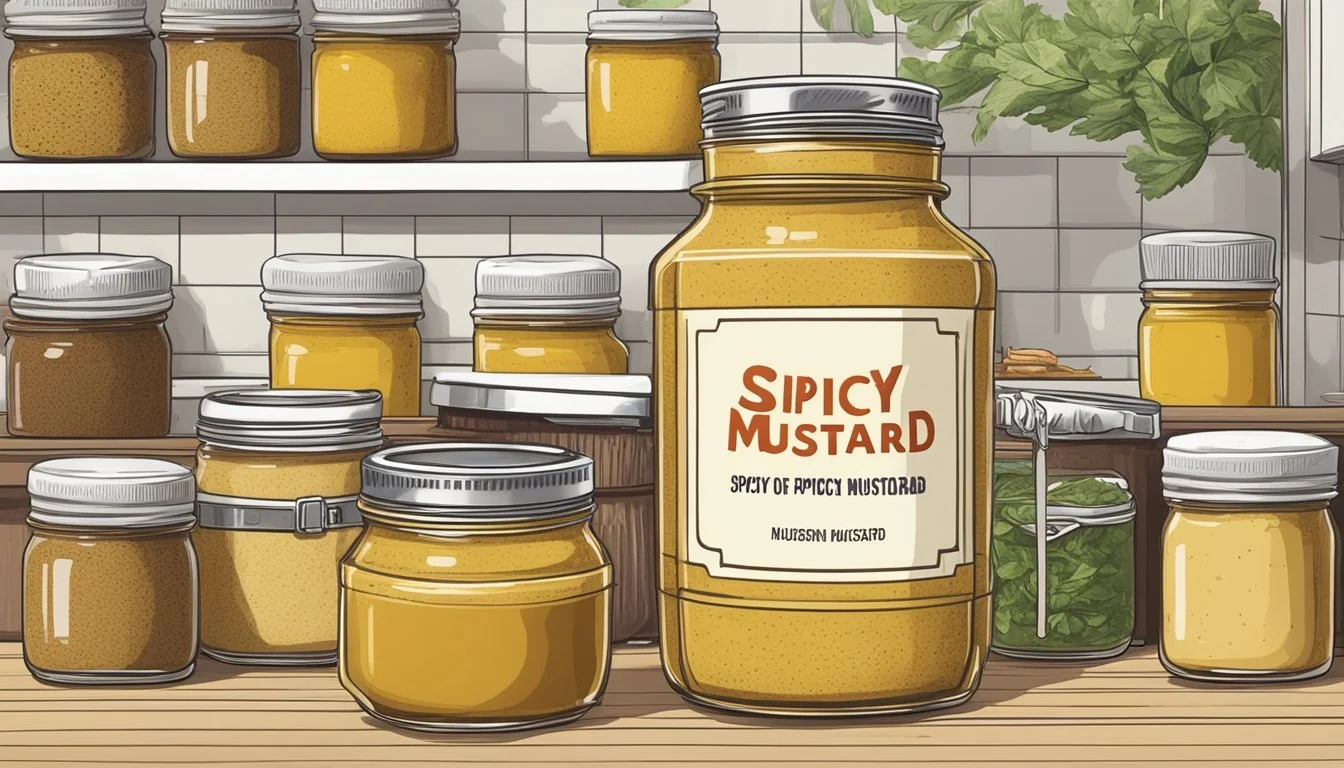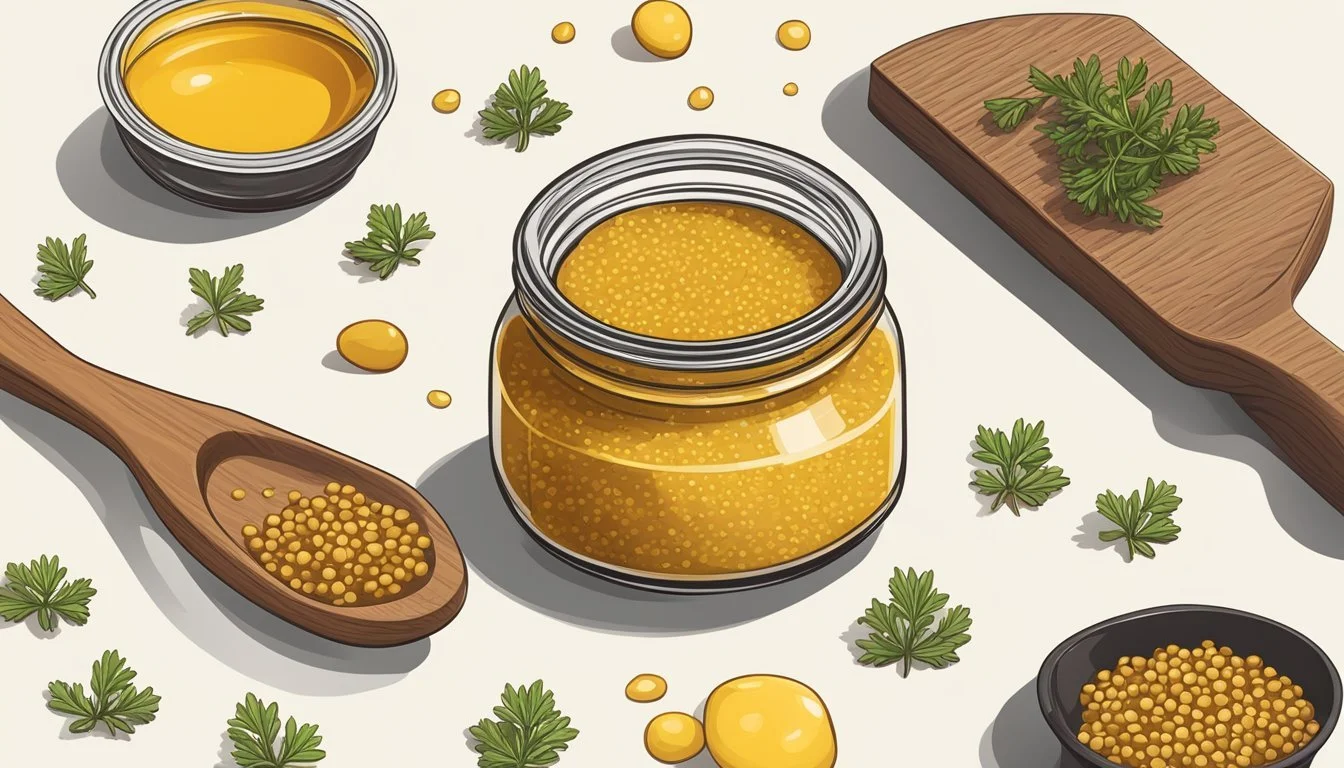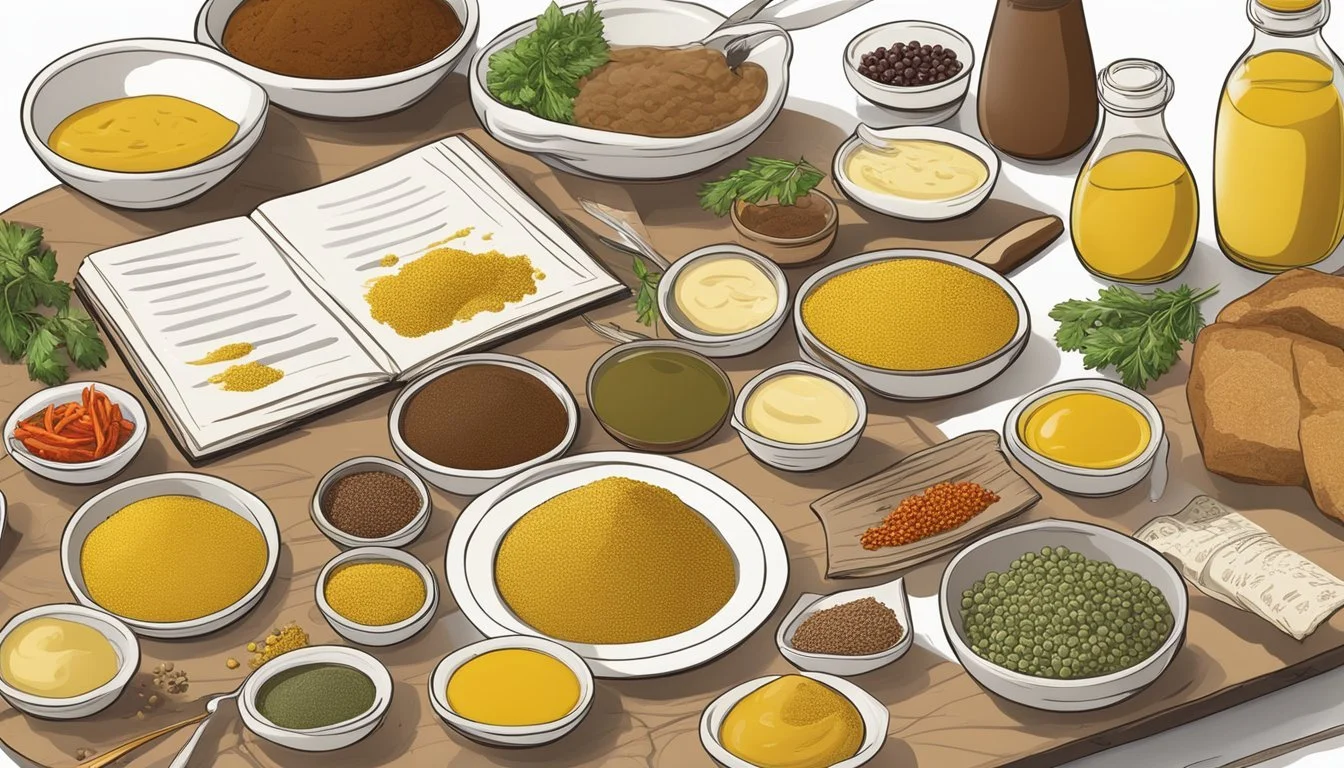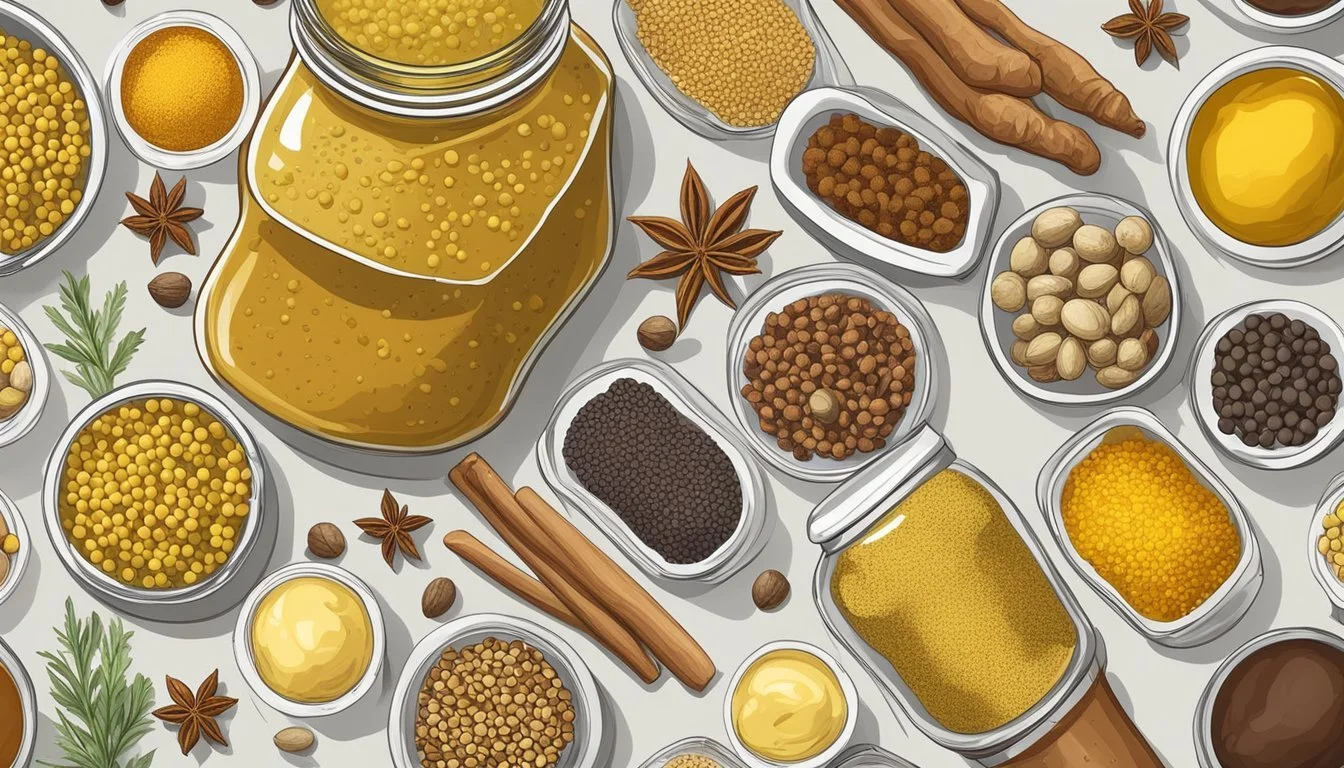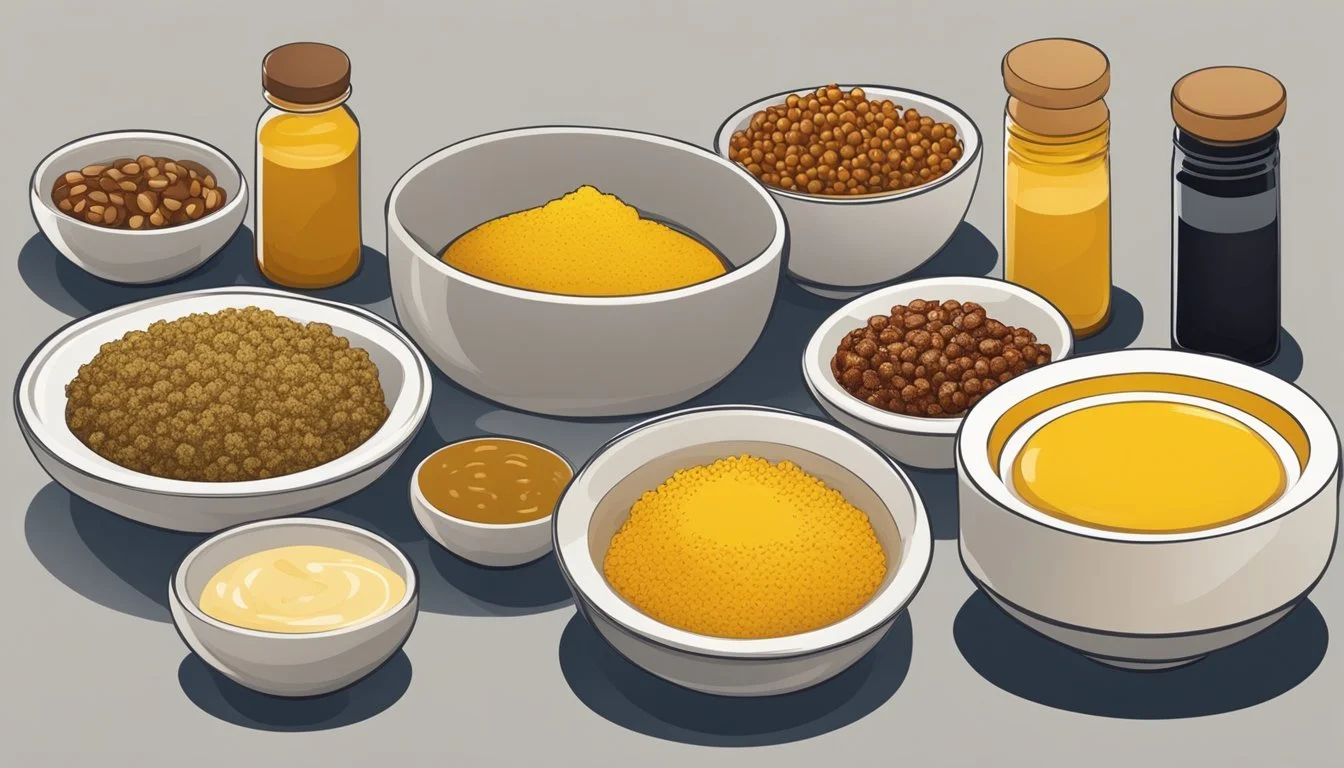Spicy Brown Mustard Substitutes
Top Alternatives for Your Recipes
Spicy brown mustard, recognized for its robust heat and distinct flavor, is a staple in many kitchens and an ingredient cherished in a variety of cuisines. In moments when this condiment is unavailable, cooks often seek alternatives that can mimic its unique qualities in their recipes. The quest for a substitute for spicy brown mustard can lead to a selection of suitable options that balance both the sharpness and depth of flavor found in the original ingredient.
Horseradish stands out as a fitting replacement due to its related plant family and comparable heat level, making it a useful option for those looking to replicate the kick that spicy brown mustard provides. In addition, certain mustards like Dijon or English mustard present themselves as potential substitutes, each offering a pungent taste, although with varying intensities and undertones. The choice of an alternative may vary based on the desired flavor profile and the specific culinary application at hand.
Furthermore, non-mustard alternatives such as rice wine vinegar or apple cider vinegar can also serve as replacements, imparting a tangy note to dishes although they lack the characteristic heat. These substitutes can be strategically selected to ensure the essence of spicy brown mustard is honored in both taste and spirit while accommodating the specific needs of a recipe or personal preference.
Understanding Spicy Brown Mustard
In exploring spicy brown mustard, one discovers a robust condiment with strong ties to culinary tradition and nutritional value, integral for enhancing a variety of dishes.
Origins and Composition
Spicy brown mustard, originating in Germany, is crafted from the brown mustard seeds of the mustard plant, a member of the Brassica family. The composition typically includes a blend of these ground seeds with vinegar, water, salt, and a variety of spices. Unlike other mustard varieties, it involves less vinegar, which allows its piquant flavor to stand out.
Culinary Uses
In the kitchen, spicy brown mustard is revered for its application in sandwiches, particularly those featuring roast beef. It's also a staple in cooking meats, where it acts as a flavor enhancer in sauces and marinades. Its bold taste complements robust meats and assists in creating a depth of flavor for many dishes.
Nutritional Profile
Nutritionally speaking, spicy brown mustard is low in calories and serves as a source of antioxidants due to the presence of mustard seeds. Despite its low-calorie count, it adds significant flavor without compromising nutritional goals, fitting comfortably into a variety of diets.
Common Spicy Brown Mustard Substitutes
When a recipe calls for spicy brown mustard and it's not on hand, several alternatives can provide similar heat and flavor profiles. Understanding these substitutes can help maintain the intended taste and texture of a dish.
Dijon Mustard
Dijon Mustard is known for its creamy texture and sharp tanginess, often attributed to the use of white wine during its making. While milder than spicy brown mustard, Dijon can serve as a fitting substitute, especially in dressings and marinades where its flavor can stand out without overpowering.
Yellow Mustard
A more common condiment in many households, Yellow Mustard offers a milder taste compared to spicy brown mustard. Its bright color comes from turmeric. In a pinch, yellow mustard can step in as a substitute for brown mustard, lending a softer heat and acidity to dishes.
Honey Mustard
Honey Mustard blends the characteristic heat of mustard with the sweetness of honey, resulting in a condiment with a balanced profile. It can replace spicy brown mustard in recipes where a touch of sweetness is acceptable, slightly altering the final dish with its unique taste.
Horseradish-Based Substitutes
Substitutes that build on the heat of horseradish offer a similar punch to spicy brown mustard. Prepared horseradish or a horseradish sauce can mimic the heat, though they lack the complexity of spices found in mustard. These substitutes work well in cold dishes such as sandwiches and salads.
Homemade Mustard Blends
For those who prefer a DIY approach, Homemade Mustard Blends using mustard powder mixed with vinegar and spices can closely match the texture and flavor of spicy brown mustard. By adjusting the ratios, one can customize the level of tanginess and heat to personal preference, achieving a close replication of the store-bought variety.
Factors to Consider When Choosing a Substitute
When selecting a substitute for spicy brown mustard, it is crucial to consider several key factors that affect the overall flavor and suitability of the condiment in various dishes.
Flavor Profile
Spicy brown mustard is known for its robust, tangy, and slightly pungent flavor. It possesses a distinct mustard taste that complements a variety of foods. Any substitute should have a similar flavor profile to maintain the integrity of the dish. Whole grain mustard could be a suitable substitute due to its similar mustard flavor and tangy notes.
Texture and Consistency
The texture and consistency of spicy brown mustard are typically coarser and grainier than yellow mustard, owing to the presence of bran in its composition. Substitutes should mimic this grainy texture to match the original condiment's mouthfeel. Whole grain mustard, once again, closely matches the texture with its visible mustard seeds.
Intensity and Spice Level
Spicy brown mustard has a moderate heat and spice level. A substitute must therefore provide a comparable amount of heat without overpowering the dish. Horseradish may be considered for its sharpness but should be used sparingly as it is more intense.
Culinary Application
Spicy brown mustard is versatile and used in salad dressings, marinades, burgers, and condiments.
A replacement must perform well across these applications. Honey mustard could serve as a substitute in dressings for its similar texture, but it will impart a sweeter taste.
In marinades, substitutes must not only have the right flavor but also possess the ability to emulsify and blend with other ingredients.
Alternative Ingredients to Create Similar Flavors
When crafting a substitute for spicy brown mustard, individuals can explore using a blend of spices and herbs, vinegar, and various sweeteners to imitate the complex flavor profile specific to this condiment.
Using Spices and Herbs
Ginger: It imparts a mild heat and can be used in small quantities to emulate the spicy aspect of brown mustard.
Cayenne: A pinch can substitute the inherent heat in spicy brown mustard, creating a similar warming effect.
Garlic Powder: Provides the savory background noted in many mustard condiments.
Cinnamon and Nutmeg: These can be used sparingly to add a warm, aromatic undertone.
Blend of Vinegars and Acids
A careful blend of acids can mirror the tangy component of brown mustard.
Apple Cider Vinegar: Its fruity tang complements the spices well and can be combined with other ingredients to balance the overall flavor.
Lemon Juice: Introduces a fresh acidity that can brighten the spice blend.
White Wine: Adds depth and can be used to soften the edges of stronger spices.
Verjuice: Offers a gentle acidic profile, making it a suitable component for brown mustard alternatives.
Sweeteners and Seasonings
Balancing the heat and acidity with sweetness and salt can create a well-rounded flavor profile.
Sugar: A small amount can reduce bitterness and provide balance.
Honey Mustard: Its inherent sweetness and mild spice make it a useful base for mixing with stronger spices.
Maple Syrup: Brings in a complex sweetness that can complement the overall flavor profile.
Salt: Essential for enhancing all flavors and tying the ingredients together.
How to Make a Substitute at Home
Creating a homemade substitute for spicy brown mustard involves selecting the right type of mustard seeds, choosing a vinegar that complements the desired flavor profile, and combining these with other ingredients to replicate the complex taste and texture of the original condiment.
Selecting the Right Mustard Seeds
The foundation of any mustard is its seeds. For a homemade spicy brown mustard substitute, it's essential to choose seeds that will provide the necessary heat and pungency.
Yellow mustard seeds: These are mild and less spicy, suitable for a milder mustard blend.
Black mustard seeds: They are most pungent and offer intense heat, a closer match to spicy brown mustard.
White mustard seeds: These have a medium level of heat and can be used as a base and mixed with black seeds for a balanced heat profile.
Choosing the Vinegar
Vinegar is a key ingredient that affects the overall taste and preservation of mustard.
Vinegar: Regular white vinegar lends a sharp, clean acidic flavor to the mustard.
Apple cider vinegar: It provides a fruitier, tangier taste which can add depth to the mustard.
For an alternative twist, vinegar made from unripe grapes, also known as verjus, can contribute a subtle, wine-like acidity.
Mixing and Matching Ingredients
To replicate the flavor and texture of spicy brown mustard, one should incorporate additional ingredients that complement the heat and tanginess of the seeds and vinegar.
Flavor: A blend of spices like garlic and paprika can be added to round out the flavor. These should be used cautiously to not overwhelm the mustard's inherent taste.
Texture: The mustard can be left whole grain for a coarse texture, or it can be blended to match the consistency of the original spicy brown mustard.
A user might want to consider using a sweet element such as honey if a sweeter, less intense mustard is preferred.
By carefully selecting and combining these elements, one can prepare a spicy brown mustard substitute at home that resonates with the robust flavor and kick of the store-bought variety.
Tips for Using Mustard Substitutes in Recipes
When modifying recipes to accommodate mustard substitutes, it is crucial to balance the overall flavor profile and consider any dietary restrictions, while also understanding how these substitutions may affect the dish's preservation and storage.
Adjusting Flavor Balance
Substitutes for spicy brown mustard should complement the flavor intensity and profile of the original ingredient. For instance:
Dijon Mustard: Rich and tangy, it can be used on a one-to-one basis but may introduce a sharper note.
Yellow Mustard: Milder and less complex, one might need to use a touch more to replicate the depth of spicy brown mustard.
Horseradish: Given its intense heat, start with half the amount and adjust to taste.
A table to simplify the substitution ratio:
Substitute Ratio Taste Note Dijon Mustard 1:1 Sharper, more intense tang Yellow Mustard 1:1 or more Milder, less spicy Horseradish Start with 1:2 Very intense heat, use sparingly
Considering Allergies and Dietary Restrictions
When selecting a mustard substitute, one must be aware of common allergies and dietary preferences, such as gluten sensitivity or mustard allergy. Here's what to note:
Mustard Allergy: Choose non-mustard based alternatives like apple cider vinegar or rice wine vinegar.
Gluten-Free: Ensure that the substitute chosen does not contain gluten, as some mustard products might, depending on how they're processed.
Preservation and Storage
Understanding the shelf life and storage requirements is important to maintain the substitute's quality over time. For instance:
Refrigeration: Mustard substitutes generally require refrigeration after opening.
Shelf Life: Substitutes might differ in shelf life; for example, horseradish may have a shorter shelf life compared to processed mustards.
Remembering these few key points will help maintain the integrity of the dish while addressing the needs for a mustard substitute.
Pairing Food with Mustard Substitutes
Finding the right mustard substitute can enhance the flavor profile of various dishes, from classic sandwiches to gourmet marinades. Here's how to match substitutes to the meals you love.
Sandwiches and Burgers
For sandwiches and burgers, where mustard's tangy flavor is key, Dijon mustard is a go-to replacement, offering a similar sharpness. If one wishes to add a hint of sweetness to deli meats or pastrami, honey mustard makes for a balanced swap. Horseradish can also deliver a comparable heat, especially in hot dogs, but should be used sparingly due to its intense pungency.
Salads and Dressings
In salads and dressings, where spicy brown mustard typically offers a peppery bite, a mustard powder mixed with a bit of vinegar can replicate the needed kick. For a smooth vinaigrette, a blend of rice wine vinegar or apple cider vinegar with a touch of sugar can imitate the tangy sweetness.
Barbecue and Marinades
Barbecue sauces and marinades require a mustard that complements the smoky, sweet flavors of the meat. A whole grain mustard can substitute nicely here, adding both texture and a sharp taste without overpowering. Alternatively, for a glaze with zing, mix a little mustard powder with honey or brown sugar.
Snacks and Appetizers
For snacks and appetizers, like pretzels with a dipping sauce, honey mustard is an excellent substitute, providing a balance of sweetness against a subtle heat. If one seeks an assertive flavor, akin to spicy brown mustard for a hotdog, consider using a lesser amount of horseradish.
Common Questions About Mustard Substitutes
When choosing a substitute for spicy brown mustard, it's important to consider how the alternative will affect taste, nutrition, and its availability. Substitutes can range from similar mustard forms to completely different ingredients, impacting the final dish's flavor profile and health benefits.
Taste and Flavor Comparisons
Spicy brown mustard is known for its bold, pungent flavor and moderate heat. Substitutes such as Dijon mustard or yellow mustard can offer similar heat levels and complexity. Here's how they compare:
Dijon Mustard: A bit creamier with a sharp, strong flavor, less vinegary but similar in heat.
Yellow Mustard: Milder and less spicy, with a more pronounced acidity.
For a non-mustard alternative, horseradish provides a similar heat level, although it is sharper and can be more intense.
Impact on Health and Nutrition
Mustard seeds, the base for spicy brown mustard, are low in calories and contain beneficial antioxidants. When selecting a substitute:
Mustard substitutes generally maintain low calorie content.
Horseradish is also low in calories and may offer comparable antioxidants.
Substitutes can vary in nutritional value, with some containing added sugars, like honey mustard, which may increase calorie content.
Availability and Accessibility
Spicy brown mustard and its substitutes are typically easy to find at a local grocery store. Some substitutes, however, may require a trip to specialty shops:
Mustard seeds can be purchased whole and ground at home; available in most spice aisles.
Dijon and yellow mustards are widely accessible in most stores.
Horseradish may be found fresh or prepared, though fresh horseradish is often at specialty shops.

